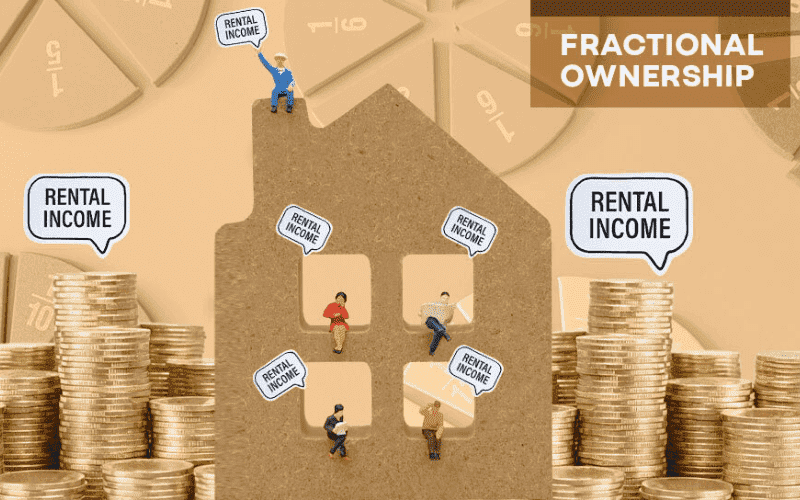It becomes appropriate to discuss fractional ownership, a financial strategy that has been gaining traction and changing the real estate market. Especially in the UK, this investment vehicle has emerged as a goldmine, providing investors with a method to acquire valuable real estate and earn consistent rental income without having to assume full ownership responsibilities.
Why should you invest in real estate in the UK?
One of the top locations for real estate investment is the United Kingdom, and there are a number of reasons why. The legal system in the United Kingdom provides a transparent and reliable foundation for investors. Cities such as London provide great rental yields because of their strong rental market and high demand for properties. In addition, the UK is more appealing for long-term capital growth because of the historical appreciation of property values over time. According to Statista, the UK real estate industry engaged over 545,000 people and generated over £65 billion in revenue annually.
Various UK Real Estate Investment Choices
It’s important to comprehend the range of real estate investment possibilities accessible in the UK before we get into fractional ownership.
- Buy-to-Let Residential Property
- Real Estate Investment Trusts (REITs)
- Commercial real estate
- Land and CrowdfundingF
- Fractional Ownership
In this article, our focus is on the burgeoning realm of fractional ownership and its expanding popularity in the United Kingdom.
Understanding Investment in Buy-to-Let Fractional Real Estate
Rather than owning a property outright, fractional real estate investing entails several people or investors jointly owning a part or percentage of a property. With the help of this shared ownership model, investors can pool their resources, easing the financial strain and providing access to high-value properties that might not otherwise be within their budget. Legal structures such as corporations, trusts, or partnerships enable fractional ownership, simplifying property management. These structures often combine with professional management services. Legal agreements outline the responsibilities and rights of every fractional owner.
The popularity and demand are on the rise.
Because regular property purchases are difficult for many, the rise in fractional property ownership might be attributed to the rising cost of living. Fractional ownership offers an affordable option for individuals to diversify their holdings, enter the real estate market, and potentially benefit from property appreciation and rental revenue.
Buy-to-let fractional real estate investing has seen a significant surge in popularity in the United Kingdom in recent years. The cost of living issue, shifting investor strategies, legislative changes, and dynamic market adjustments all have an impact on this trend. Fractional ownership is a smart entry point into the UK property market, which attracts both domestic and foreign investors looking for steady profits and long-term appreciation.
The HM Land Registry reports that the average price of a home in the UK has increased by an astounding 10.8% in the past year. This strong expansion highlights how appealing the UK real estate market is to investors.
Pros and Cons of Fractional Ownership
Pros:
Accessibility:
A wider spectrum of investors can participate in real estate since fractional ownership reduces costs of entry.
Diversification:
By distributing cash over several properties, investors may reduce the effect that the performance of a single property will have on the portfolio investments as a whole.
Leverage:
By securing mortgages to pay for a portion of the cost of the property and possibly boosting returns, fractional owners can leverage their investments.
Property Management:
Fractional ownership offers a hassle-free experience by dividing up the responsibility of property management among owners or reputable organisations.
Cons:
Void Periods:
Just like conventional rental properties, fractional ownership is subject to void periods, which can have an effect on rental income while a property is vacant.
Regulatory Changes:
Owners of fractional properties may be impacted by changes in rental property legislation; thus, awareness and compliance are necessary to reduce risks.
In Summary,
In the UK, fractional ownership offers investors an excellent opportunity to negotiate the real estate market, see high-value properties up close, and ensure consistent rental income. Upon reflection on our year-long adventure, fractional ownership shows itself to be a vibrant and easily accessible means of accumulating wealth and a route to security and prosperity in terms of money.
Choosing a Real Estate Company with Fractional Ownership
Making the correct choice in fractional ownership real estate is essential to a profitable investing endeavour. Seek out a business that has a strong track record, a portfolio of completed fractional ownership projects, and a customer-focused philosophy. Analyse the company’s methods for continuing management, due diligence procedures, and property selection.
Disclaimer:
This information is intended for educational and informational purposes only and should not be considered as financial advice. It is advisable for readers to consult with financial professionals for personalized advice.
Citations:
https://www.novyy.com/knowledge-base/fractional-realestate-investing
https://www.nrla.org.uk/news/unlocking-the-power-of-fractional-property-investment
https://mortgagekey.co.uk/guides/how-to-make-money-from-buy-to-let




